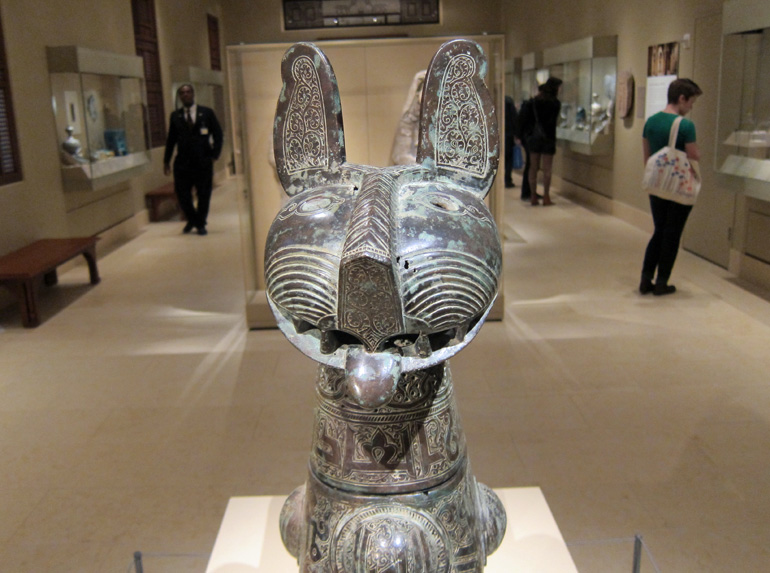Gotham Diary:
Yuk
9 November 2011
Wednesday, November 9th, 2011
Oops. I neglected to make note of Fido here’s particulars. I was accompanying Ray Soleil and an old friend from Crescent City through the new You-Know-What wing at the Museum. He’s probably not even a Fido.
I had a bit of a major yuk last night. There is nothing yucky about a yuk, and, to avoid confusion, yuks are always major. I learned the term from Fossil Darling, back in the days before I learned the danger of adopting his usages. The grown-up equivalent for “major yuk” is “fit of uncontrollable laughter.” I remember the first one; it hit me in eighth grade, reading Robert Benchley’s “What Is Humor — a Joke?” I did not read it in The New Yorker, where it appeared eleven years before I was born, but many, many major yuks have since been ignited by funny pieces appearing in that magazine’s pages, and last night’s was not an exception.
It was Bruce McCall’s parody of Jill Abramson’s Puppy Diaries. McCall has demonstrated, in recent decades, that he can be as funny with his pen as he is with his brushes. It is undoubtedly easier to write something down than to render it graphically, at least if you already have McCall’s smiling sense of the absurd. The parody, “Pet Books Proliferate,” was not immediately alluring, and I did not begin the first little story (there are three), “Tess, the Orphaned Earthworm,” with any anticipation of cathartic hilarity. I hummed along with a slight smile as the narrator, a housewife, unearthed some bait from her husband’s fishing tackle and adopted it as a pet, deciding that it was a she and calling her Empress Maria Theresa, “Tess for short — after the driving force behind the Diet of Worms. A lame joke, I admit, but love will do that to you; you say and do the silliest things.”
A lame joke? It can barely crawl. The last Diet of Worms — not the most famous one, but the one after that — was convened in 1545, almost three hundred years before Maria Theresa succeeded her father and sparked the War of the Austrian Succession. But what it lacks in wit it makes up for in cheek. Think of Ruth Draper’s Mrs Clancy, who wraps up the interruption of acquiring a new dog by telling her children that it would be “lovely” to name the animal after Dante, in honor of her Italian Lesson, “and we’ll call him Dan for short. Here, Danny Danny Danny. Oh, you is such a sweet Danny.” In the context of Draper’s extended recreation of a sophisticated New York society woman, Dan for short is such a quick swerve from the piously learned to the daily vulgate that it has the decompressive force of a bomb. “Tess for short” hasn’t got the same traction, but it scattered the seeds of an explosion — “lame joke” sprinkled a few more — that went off a few seconds after I read the last line of this lugubrious tale. “A few hours later, still sobbing, I carried the dangling little question mark of charred gristle that had been my Tess out to the back flower bed and gently lowered her into the earth whence she had come.”
I chuckled; I chuckled again a few times. Then I was roaring, helplessly. The absurdity of it all! The absurdity of it all, that is, corseted in the whalebone of exquisitely chosen language and made to strut about like Margaret Dumont. In between falling in love with and naming Tess, the narrator quotes from Marjorie Maude Falstaff’s “touching memoir, ‘My Life with Bert the Wonder Dew Worm’.”
O faithful earthworm, silently churning and aerating deep in the loam of the earth, that plant life my flourish! Thou hast done more good for mankind than all the dogs every whelped.
There is something very funny in the threat that these two short but florid sentences make of never coming to an end. Spare me, you automatically beg; the very word “thou” is no longer supportable. And McCall promptly does spare you, moving right on to the Diet of Worms.
I called Fossil, but after two rings I remembered that he was out for the evening. I didn’t leave a message.




















